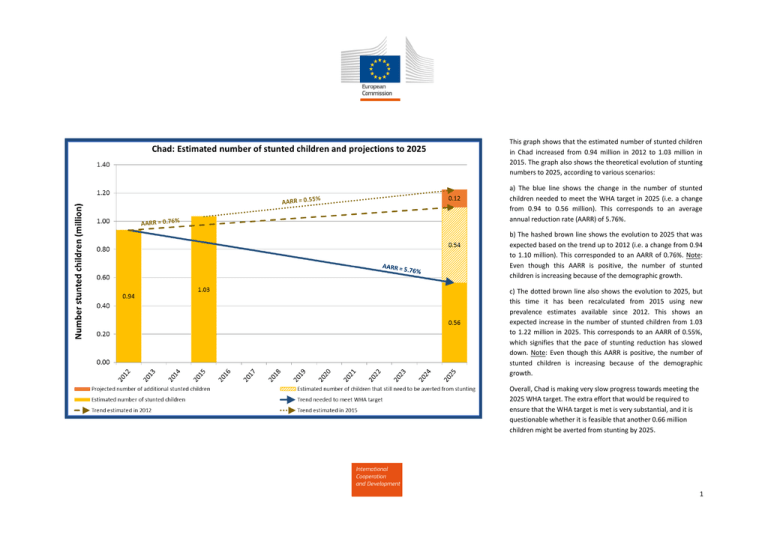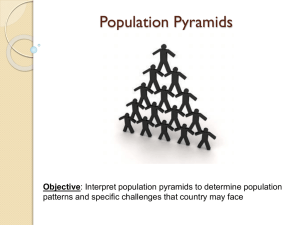Chad
advertisement

This graph shows that the estimated number of stunted children in Chad increased from 0.94 million in 2012 to 1.03 million in 2015. The graph also shows the theoretical evolution of stunting numbers to 2025, according to various scenarios: a) The blue line shows the change in the number of stunted children needed to meet the WHA target in 2025 (i.e. a change from 0.94 to 0.56 million). This corresponds to an average annual reduction rate (AARR) of 5.76%. b) The hashed brown line shows the evolution to 2025 that was expected based on the trend up to 2012 (i.e. a change from 0.94 to 1.10 million). This corresponded to an AARR of 0.76%. Note: Even though this AARR is positive, the number of stunted children is increasing because of the demographic growth. c) The dotted brown line also shows the evolution to 2025, but this time it has been recalculated from 2015 using new prevalence estimates available since 2012. This shows an expected increase in the number of stunted children from 1.03 to 1.22 million in 2025. This corresponds to an AARR of 0.55%, which signifies that the pace of stunting reduction has slowed down. Note: Even though this AARR is positive, the number of stunted children is increasing because of the demographic growth. Overall, Chad is making very slow progress towards meeting the 2025 WHA target. The extra effort that would be required to ensure that the WHA target is met is very substantial, and it is questionable whether it is feasible that another 0.66 million children might be averted from stunting by 2025. 1 The prevalence of stunting in Chad was 39.9% in 2015. The graph shows the theoretical evolution of stunting prevalence to 2025, according to various scenarios: a) The hashed brown line presents the projected evolution of the stunting prevalence to 2025 based on the trend calculated using data up to 2012, and shows that the prevalence of stunting was expected to decrease to 35.3% by 2025. b) The dotted orange line also shows the projected evolution to 2025, but this time it has been recalculated using new prevalence estimates available since 2012. This shows that the pace of stunting reduction in the country has slowed down and that the prevalence of stunting is now expected to decrease to 37.1% by 2025. The blue dot shows the prevalence of stunting that is associated with the WHA target of a 40% reduction in the number of stunted children between 2012 and 2025, which in this case translates to 18.0% of children stunted in 2025. Overall, Chad is making slow progress towards meeting the 2025 WHA target. If the current trend continues, the country is unlikely to meet the WHA target by 2025. 2





